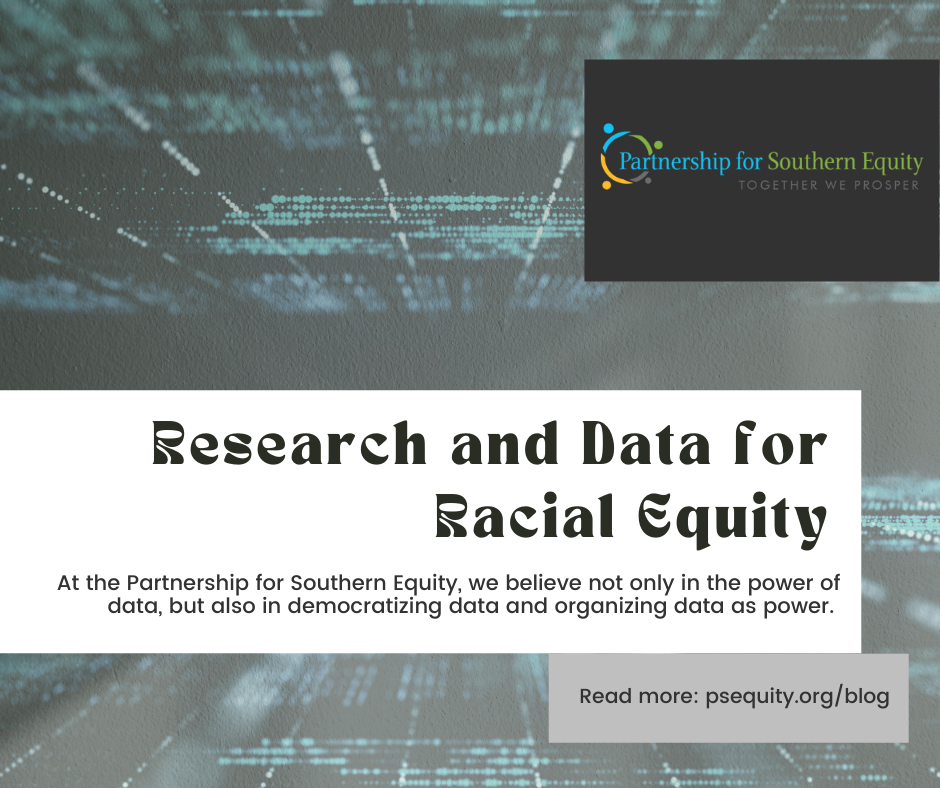Nothing About Us Without Us: Participatory Policy to Advance Racial Equity

Sarah Al-Khayyal, Policy Manager
Here at the Partnership for Southern Equity (PSE), we believe that equity is a “way” rather than a “what.” Equity is not a checkbox, a one-time diversity and inclusion training, nor a performative legislative resolution. Rather, we seek to breathe equity into the entire civic process, from start to finish, and back to the start again. A significant piece of this work consists of activating the communities who are directly impacted by inequitable policies and equipping them with the necessary tools to advocate for their own rights. We operate with the fundamental understanding that the people closest to the problems are also closest to the solutions, and when it comes to shaping equitable policy, there must be “nothing about us without us.”
One year ago, we established the Data, Research, Innovation, and Policy team – DRIP for short (yes, there will be swag!). Our team works cross-functionally with each of PSE’s issue area portfolios to leverage data, research, innovation, and policy efforts to advance racial equity and systems transformation. Continuing our DRIP blog series, “Research and Data for Racial Equity”, we focus on how we leverage policy to deliver equitable outcomes to the communities who need it most.
At the core of our policy work is the belief that every issue is a policy issue—most social ills are the result of poor or non-existent policy. The solution to such ills, therefore, must involve a policy dimension. This is particularly pertinent with the issue of institutional racism, which was birthed out of and has been perpetuated by racist policies and biased enforcement of laws. But we believe that we can use innovative, data-driven research to advance meaningful policy change. The DRIP team works collaboratively to collapse the distance between theory and practice; research and action. Where many status quo policy approaches tend to silo data, research, and decision-making away from community knowledge and grassroots organizing, we take a systems approach to influence outcomes from within communities.
Most grassroots organizations and communities lack the resources, capacity, and willingness to effectively engage in the policy-making process. That is where we come in.
We are what some may call renegade researchers. We straddle the worlds of frontline organizers and policy makers; we make moves on the street and in the board room; and we value both community knowledge and academic research. DRIP is bridging the gap between these long-divorced worlds, infusing the policy-making process with grassroots insights and data equity. Our primary avenues of impact are 1) community education and activation, and 2) legislative thought leadership.
Community Education and Activation
The DRIP team is developing several resources designed to enable activation of our ecosystem around the policy process in a way that tangibly influences outcomes. We hope to provide our communities with the tools needed to not only speak authoritatively on their own about policy matters, but also to direct their energy towards the right audiences and decision makers. You can look forward to resources such as open-source training modules, fact sheets, legislation scorecards, and talking points.
Legislative Thought Leadership
DRIP is also helping to develop a bold and visionary policy agenda for PSE, representative of our issue areas. In partnership with our Just Growth, Just Opportunity, Just Health, and Just Energy teams, we are working to add our unique racial equity lens to existing and future policy conversations. We aim to use our intellectual capital to help set a standard for what equitable policy looks like.
While we are in the process of building out our policy arm, we are already engaging in this work across the PSE ecosystem. For example, PSE’s Issue Area Circles coalesce around policy and programmatic solutions to their corresponding issue areas. One of our most active Circles is the Just Energy Circle, which utilizes the inherent strength of coalitions by convening technical experts, advocates, and community members to envision more equitable energy policy and co-create clean energy solutions that benefit everyone.
In a related vein, PSE is also party to the Georgia Power Integrated Resource Plan (IRP) this year. Every three years, Georgians have the opportunity to participate in the IRP process, which is facilitated by the Georgia Public Service Commission. The IRP is a roadmap for Georgia’s energy future; the design and implementation of the IRP has a direct impact on who gets to participate in that energy future.
This is why PSE is intervening in the IRP process. In partnership with Georgia Interfaith Power and Light (GIPL), and with representation by the Southern Environmental Law Center, PSE is a formal intervenor in the case, advocating for our community’s interests. Our IRP intervention team is advocating for the expansion of programs that would enable low-income, historically marginalized communities to participate in the shift towards clean energy while also reducing their electric bills and energy burden. These programs include a) net metering for customers that invest in rooftop solar— the expansion of which would continue to make solar energy systems more financeable, and thus more accessible to everyday Georgians, and b) energy efficiency programs—because the most affordable and greenest electricity is the electricity you do not need to generate.
Additionally, as they say, you cannot manage what you do not measure. Accordingly, we are advocating for greater data transparency and specificity, so that we can better understand the experiences of Georgia Power’s most vulnerable customers. Finally, we are advancing a line of questioning around Georgia Power’s income qualified community solar programs to move the needle towards energy justice.
These are just a few of the many ways that we are positioning our organization to influence policy towards equitable processes and outcomes. We look forward to expanding our policy agenda in the coming months, and we cannot wait to take you along for the ride towards a policy equity future.

